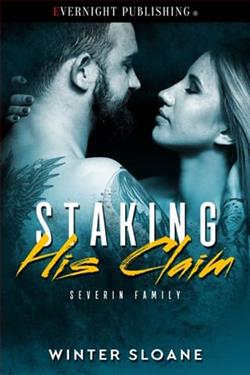Page 104 of The Lodge
Fortunately, I remember how to get to the lookout from here, not to mention that everything is clearly marked with Black Maple Lodge’s official signage.
The walk isn’t far. I stay steady on my feet, determined not to land in the medical center this time, silently going over the words I’ve planned in my head. Even once I get there—when I see him sitting on the bench, alone, his back to me, the oversized hood of his coat flecked with snowflakes—I’m still running through it all, reluctant to actually say anything.
But it doesn’t matter, because Tyler speaks first.
“You got my note.”
He hasn’t turned around; he must have heard me, or the lift on its way up.
I make my way over to him, boots crunching through the snow. He continues staring off into the distance—or whatwouldbe the distance if we weren’t currently inside a cloud—even when I join him on the bench. I sit close, turn my body to face his.
He stares at his gloved hands.
“Yeah,” I say, careful to keep my voice even. “I got your note.”
He still doesn’t look at me.
I have a strong urge to pull his hood back so I can see more of his face, but I resist. For now.
“Tyler,” I say, and finally—finally—he turns.
The look on his face breaks my heart.
I don’t know what I expected, exactly, but this isn’t it: an expression so numb, so void of emotion, it’s in danger of getting frostbite.
The more I take him in, though, the more I see that it isn’t so much the absence of feeling as it is too many conflicting ones at the same time.
Anger, simmering just beneath the surface.
Panic—fear.
Sorrow.
Exhaustion.
“I’m sorry, Alix,” he says, voice low and crackling. “I… I can’t.”
“You can’twhat?” I push.
He blinks, looks away, like it’s physically impossible to meet my eyes when he says, simply: “Stay.”
I grit my teeth, summoning the speech I went over on my way up the mountain.
“But you’re still here. You wrote, ‘Nothing in me wants this to be over,’?” I continue, quoting his own letter back to him. “Sostay.” I take a deep breath, look him right in the eye. “You don’t have to be someone who runs from problems when they get too hard—who makes himself disappear rather than face them. I don’t think you actually want to leave so much as you’re just… afraid… to face the world.”
His jaw twitches, and I know I’ve struck a nerve.
“Of course I don’t want to leave,” he says, skirting around my more pointed comment. “I’ve made a life here, one I actually enjoy. I love where I live. I love what I do. I love—who I do it with.”
“This isn’t the same as when you disappeared the first time, Tyler,” I say, a new edge in my voice. “You left for good reasons. You were trapped in your contract, surrounded by toxic people you couldn’t trust, and you found a way to get yourself out of that life. You shouldn’t be afraid to share that story with the world. Some people will never understand—but I think you underestimate the number of people whowill.”
I take another deep breath, plow forward before he can say anything. “If you run this time, it’s officially a pattern. You becomesomeone who runs. You’d be turning your back on your closest friends, the ones who saved your life by helping you go off the grid—and you’d be running from me too. I’m fully aware that I haven’t been in your life very long at all, but I know enough to recognize that this kind of connection we have? It doesn’t comealong all that often. There was something about me that made you trust me enough to let me in. Maybe I’m wrong, but I think that should count for something.”
The snow is picking up again, thicker flakes instead of the delicate ones. It’s absolutely freezing out here, and I’m shivering, but there’s no way I’m heading back down the mountain until we’re done with this conversation.
“Itdoescount for something,” Tyler says with fresh intensity. “You are the best thing that’s happened to me since I left the band, Alix. I didn’t realize how much—”
He breaks off, looks away.















